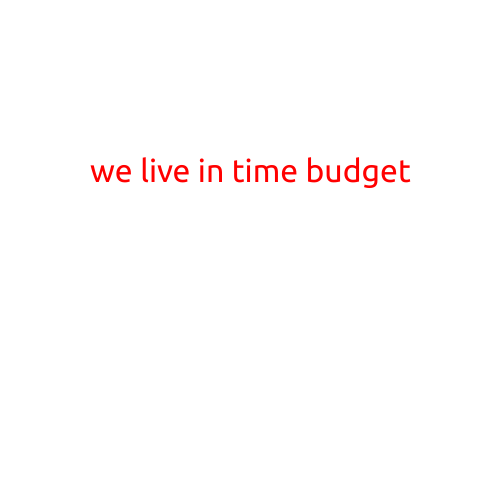
We Live in a Time Budget
The fleeting nature of time is a universal experience that affects us all. In today’s fast-paced world, we are constantly juggling multiple responsibilities, commitments, and obligations, leaving little room for error. This reality has led to the concept of a “time budget,” a metaphorical allocation of hours, minutes, and seconds to ensure we make the most of our limited time.
The idea of a time budget is not new, but its significance has grown with the increasing pace of our lives. In the past, people had more time to spare, and the concept of a 40-hour workweek was the norm. However, with the advent of the digital age, social media, and the rise of the gig economy, our daily routines have become more fragmented, leaving us with reduced time for leisure, self-care, and personal growth.
The notion of a time budget is not unlike a financial budget, where we allocate our resources carefully to ensure a secure financial future. Similarly, our time budget dictates how we allocate our 24 hours a day, seven days a week. By setting priorities, we can optimize our time usage to achieve our goals, foster meaningful relationships, and maintain our overall well-being.
So, how do we create and manage a time budget? The process begins by assessing our daily habits, identifying time-wasting activities, and streamlining our schedules. Here are some strategies to help you optimize your time budget:
- Set clear goals: Establishing clear goals helps you focus on what’s truly important, enabling you to allocate your time effectively. Prioritize your goals, and create a task list to help you stay on track.
- Track your time: Keep a daily log or use a time-tracking app to monitor how you spend your time. This helps you identify areas where you can optimize your schedule and reduce time-wasting activities.
- Eliminate distractions: Identify common distractions, such as social media or email notifications, and eliminate them while you work. Use tools like website blockers or apps that help you stay focused.
- Batch similar tasks: Group similar tasks, such as checking email or making phone calls, and complete them in one session. This reduces switching costs and increases productivity.
- Schedule breaks: Adequate breaks are essential for maintaining energy and focus. Schedule breaks into your day, and use them to refresh and recharge.
- Learn to say no: Set boundaries by saying no to non-essential commitments that can derail your schedule. Practice assertive communication to maintain a healthy work-life balance.
- Review and adjust: Regularly review your time budget and make adjustments as needed. Life is dynamic, and your time budget should adapt to changing circumstances.
In conclusion, we live in a time budget, and it’s essential to manage it wisely. By setting clear goals, tracking your time, eliminating distractions, batching similar tasks, scheduling breaks, learning to say no, and reviewing your budget regularly, you can optimize your time usage and achieve a better work-life balance.
As we navigate the complexities of modern life, it’s crucial to prioritize our time effectively. By doing so, we can cultivate a sense of purpose, reduce stress, and live a more fulfilling life.
Remember, time is a finite resource, and how you allocate it determines the quality of your life. Make the most of your time budget, and reap the rewards of a more productive, meaningful, and joyful existence.





